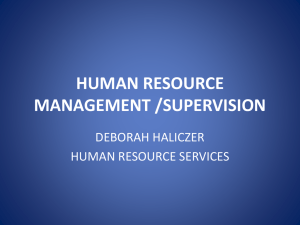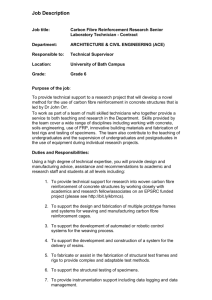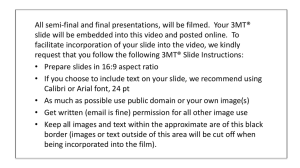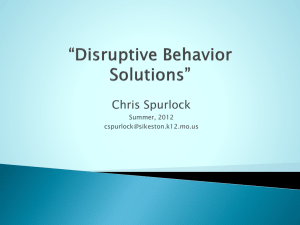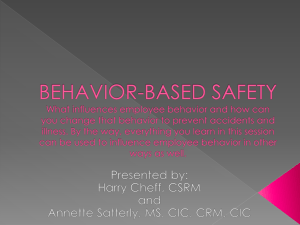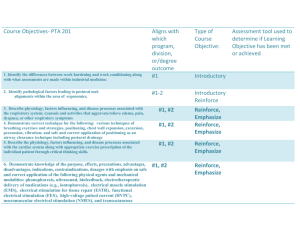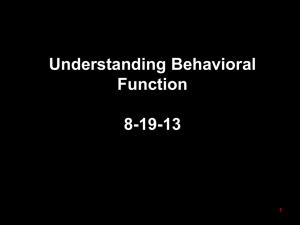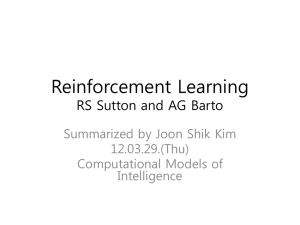NEO Performance Goals
advertisement
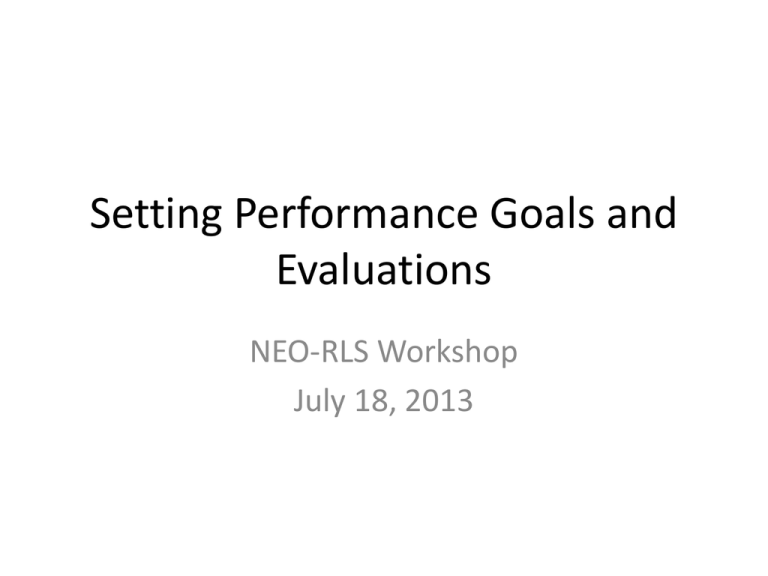
Setting Performance Goals and Evaluations NEO-RLS Workshop July 18, 2013 Why Manage Performance? • Measure real performance against expected performance • Provide constructive feedback on performance and use it to improve performance in the future • Foster mutual understanding and commitment regarding expectations and goals • Focus on employee behaviors instead of personality traits • Positively reinforce the accomplishments/strengths of the employee • Identify training and development needs • Better determine individual career paths • Provide objective basis for decisions on pay, promotion, demotion, transfer or termination • Emphasize that we care about employee growth and development Most Effective/Ineffective Supervisors Styles of Management/Traditional • Emphasize long-term results • Look for problems to solve • Rely on punishment and threats • People burn out and see no reinforcement for their efforts Styles of Management/Performance Based • Emphasize the behaviors that will achieve results • Notice what people are doing right • Give feedback and reinforcement • People want to excel Value of Measuring Performance • Progress requires measurement • Measurement develops accountability • Measurement improves supervisory decision making Reasons Employees Don’t Achieve Results • We don’t know what results to achieve (address through goal setting) • We don’t know how to achieve results (address through goal setting and giving feedback) • We don’t have the tools to achieve results (address with goal setting) • We don’t want to achieve results (address with reinforcement and consequence) Performance Management Cycle • Performance Management Is A Continuous Process • Set expectations • Measure performance • Provide feedback • Reinforce strong performance and address weak performance Setting Goals Goal Setting (Setting Expectations) • This first step in the performance cycle sets up the employee for success or failure • Pinpoint what people should do and how they should do it at the beginning of performance year • Allow employees to play a role in setting goals • Follow SMART criteria when developing goals SMART Goals • • • • • Specific Measureable Attainable Relevant Time Bound SMART Goals • Vague: Work more cost and time efficiently • Smart: Prepare all incoming resources for circulation within a 24-hour timeframe in order to improve customer service • Vague: Be nicer to customers • Smart: Smile, greet customers and ask “how can I help you?” when they approach desk….. Pinpointing The Right Goals • Pinpoint the right goals (or results) in order to focus on behavior that produces value within the organization Key Questions for Pinpointing Goals • Is there a problem that needs improvement? • Is there an initiative that you can impact? • Has your supervisor given you a result you need to work on? Writing a Performance Plan • Determine how often you will provide feedback to improve poor performance • Address resources needed by employee to meet objective • Review goals frequently with employee (at least quarterly, even 10-15 minutes • Note employee progress on back of performance plan and both initial • Keep goals fluid, modify as needed Performance Plan Exercise • Imagine….that you have a long-term direct report who has long since retired “on the job”. She does minimum work on a consistent basis. • Write 2-3 relevant goals using SMART criteria for the person. Use the job expectations common to your direct reports to set this goal. Value of Measuring Performance • Progress requires measurement • Measurement develops accountability • Measurement improves supervisory decision making Information Sources for Performance Evaluation • • • • Employee Performance Plan Verbal and written feedback provided Employee self-evaluation (voluntary) Performance charts/checklists (attendance records, productivity reports) • Commendations, Discipline • Feedback from others • Last year’s performance evaluation The Self Evaluation • Tool that provides supervisors with feedback from employees (voluntary in most libraries) • Give to the employee 2 weeks prior to the evaluation and ask for it to be returned prior to the evaluation • Not a mirror image of the supervisor’s evaluation but does ask employees for input; employee uses a self-evaluation form (not the performance evaluation form you use) Writing the Performance Evaluation • Complete PE form from your Library • List performance goals identified on the Performance Plan at the beginning of performance year • Consider whether and how each objective was met. Be specific and include time frame. • To determine final rating, consider…work complete? Done on time? Done effectively? • Level of difficulty? Amount of supervision needed? • Need to be approved by your supervisor PRIOR to PE discussion Feedback Guidelines • Be specific—identify what is right and wrong with their work • Provide immediate, frequent feedback • Address both individual and group performance—shape and reinforce individual effort and team cooperation Dealing with Problem Performance • Consult with supervisor and/or HR Director prior to PE discussion • Tell the employee the behavior you don’t want • Explain why it’s not acceptable, impact on Library • Explain what the consequences will be if it happens again • Describe the behavior you do want • Document! Giving Negative Feedback • • • • • • • • • Make it immediate Be consistent Positively reinforce what you do want Minimize attention- don’t ‘set an example’ Be fair Punish the behavior, not the person Stay calm Say what you mean, mean what you say Conduct conversation in private work space Scenario • Fred Jones is a long-term circulation clerk who has good attendance. He also has good performance. However, he regularly chats at length with most customers and other circ staff have to compensate for him. You were good friends with Fred before you got promoted to be the circulation supervisor. • How would you give him feedback about this? Reinforcing Strong Performance • Gets more of the efforts and results that are needed within the Library • Satisfies and retains the best • Recognizes the commitment and dedication of employees • Recognition? Special opportunities? Attention and interest? Reinforcement Guidelines • • • • • • Be specific Be sincere Reinforce immediately Personalize the reinforcement No ‘but’s” Spend more time focusing on strong performance than problems/errors Barriers to Giving Reinforcement • • • • • Always being in a hurry High stress levels Having negative expectations of others Not knowing what motivates employee Not planning reinforcement Common Performance Evaluation Errors • Including feedback employee has never heard • Losing objectivity • Reluctance to negatively evaluate employee for fear of confrontation, reprisal, fear of lack of management support, fear of Union reaction • Focusing your evaluation on employee’s most recent performance • Rating an employee high/low in all areas because of strong/poor performance in one area • Not getting your supervisor’s input/approval Conducting the Conference • Try to sit at a table or on the same side of desk to improve communication • Use the performance review as your guide • Remember this is not a disciplinary meeting • Refer to the feedback given throughout the year to support your evaluation • Be prepared with additional documentation, examples to support evaluation • Combine discussion of negative points with performance improvement suggestion • Ask employee for their input on areas needing improvement • Give the employee time to talk. Listen carefully. • If there is disagreement, don’t argue. Listen. • If employee is able to show some of your comments are inaccurate, be open to changing them. • Have employees sign evaluation, indicating that they have received and discussed it, not that they agree with it. Is there appeal process? Union rep needed? Consult your supervisor, HR. • Schedule a conference to discuss the performance plan for the coming year. • Emphasize that you will be providing frequent performance feedback throughout the year to support their efforts. Questions? Comments?

